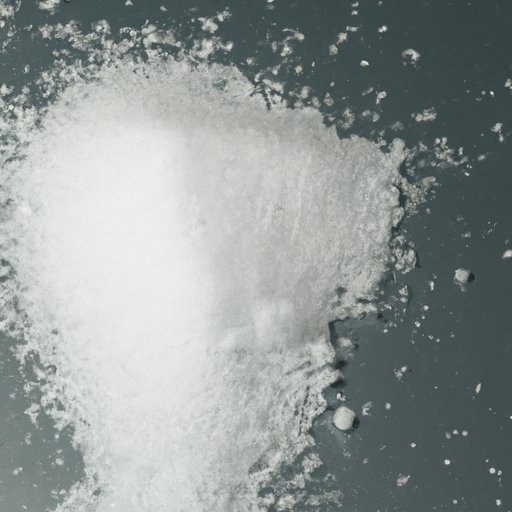
Introduction
Have you ever found yourself stranded on an island or lost in a wilderness area with only salt water to drink? Or perhaps you’ve wondered if it’s safe to consume salt water when you’re dehydrated? Whatever the situation may be, the question remains: can you drink salt water?
This article aims to provide an informative overview of salt water and its effects on our bodies. Whether you’re a survivalist, an athlete, or just simply curious, this article is for you. Let’s dive in!
The Truth About Drinking Salt Water: Is It Safe or Dangerous?
While salt is a necessary component of our diets, consuming too much salt water is harmful to our bodies. Drinking salt water leads to dehydration, as our kidneys cannot effectively remove the excess salt in our systems.
Moreover, salt water contains high levels of sodium, which can cause complications such as high blood pressure, heart disease, and stroke. Drinking salt water can also disrupt our body’s electrolyte balance, leading to muscle cramps, weakness, and seizures.
Surviving in the Wilderness: Tips for Making Salt Water Drinkable
If you find yourself in a survival situation with only salt water to drink, there are ways to make it safely consumable. One method is using a solar still, which involves creating a device that uses the sun’s heat to evaporate the salt water and condense the water vapor to produce fresh drinking water.
Another method is using desalination devices, which use a variety of technologies to extract salt particles from seawater. These include reverse osmosis, distillation, and electrodialysis.
Before attempting either of these methods, make sure you have the necessary tools and knowledge to carry them out safely. See our step-by-step instructions for each method below:
Solar Still Method:
1. Dig a hole in the ground and place a container in the center
2. Surround the container with moist vegetation or urine to increase evaporation
3. Cover the hole with plastic wrap, and place a rock in the center over the container to create a cone shape
4. Wait for the sun to heat the salt water, creating water vapor that condenses on the plastic wrap and drips into the container
5. Collect the fresh water and remove any remaining salt particles
Desalination Device Method:
1. Purchase or construct a desalination device, such as a reverse osmosis filter or a distillation kit
2. Follow the manufacturer’s instructions carefully to ensure proper usage
3. Run the salt water through the device, collecting the fresh water that is produced
4. Remove any remaining salt particles from the water
Hydrating Your Body: Why Salt Water Isn’t the Answer
Staying properly hydrated is essential for our bodies to function properly, especially for athletes and those engaging in physical activity. While salt water may provide temporary thirst relief, it ultimately hinders our body’s ability to hydrate properly.
When consuming salt water, our bodies are actually losing more water than they are absorbing, perpetuating a cycle of dehydration. Consuming fresh water is the best way to stay properly hydrated and prevent complications such as heat stroke, muscle cramps, and fatigue.
Salt Water vs. Fresh Water: Which is Healthier?
While salt water does contain minerals that are beneficial to our bodies, fresh water is typically considered the healthier choice. Fresh water contains fewer impurities and harmful substances, making it easier for our bodies to process and absorb.
Moreover, consuming salt water puts a strain on our bodies’ systems and can lead to health complications in the long run. Fresh water is readily available in most areas and should be the go-to choice for proper hydration.
The Dangers of Dehydration: Why Salt Water Won’t Satisfy Your Thirst
Dehydration can have severe consequences on our bodies, both in the short and long term. Mild dehydration can cause symptoms such as headaches, dry mouth, and fatigue, while severe dehydration can lead to heat exhaustion, heat stroke, and even death.
While salt water may provide temporary relief from thirst, it ultimately contributes to dehydration, making it an unreliable source for hydration. Drinking fresh water is the best way to prevent dehydration and stay properly hydrated.
The Impact of Drinking Salt Water on the Environment
In addition to its effects on our bodies, drinking salt water also has a significant impact on our environment. Desalination processes can have harmful effects on aquatic ecosystems, as they require large amounts of energy and can produce waste products such as salt brine.
Moreover, salt water disposal can have adverse effects on marine life, as excess salt in our oceans can lead to decreased oxygen levels and habitat destruction. It’s important to consider the environmental impact of drinking salt water and take steps to minimize our footprint.
Conclusion
In conclusion, drinking salt water is not a viable option for hydration or survival. Consuming salt water can lead to dehydration, electrolyte imbalances, and health complications. If you find yourself in a survival situation with only salt water to drink, there are ways to make it safely consumable, such as using a solar still or desalination device.
However, it’s important to prioritize properly hydrating our bodies with fresh water and consider the environmental impact of consuming salt water. By being mindful of our water consumption habits, we can ensure a healthier future for ourselves and our planet.





